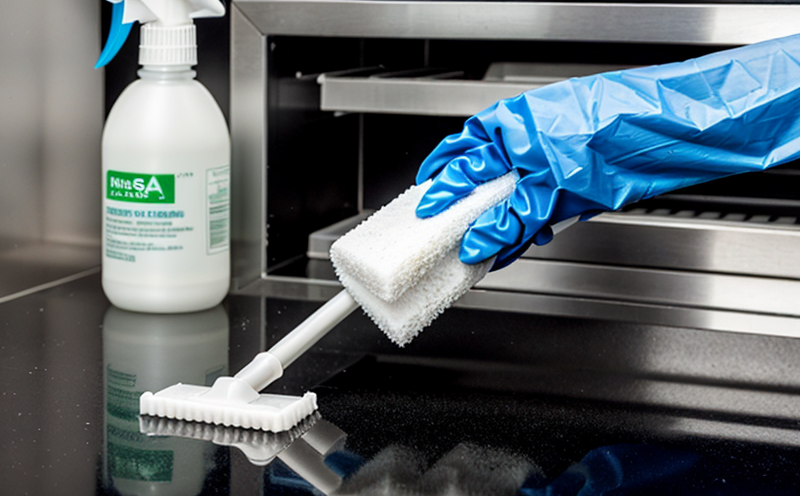ISO 305 Antimicrobial Stability Testing of Plastics
The ISO 305 standard is pivotal in evaluating the stability and effectiveness of antimicrobial properties incorporated into plastics. This testing ensures that the antimicrobial additives remain stable over time, maintaining their efficacy against targeted microorganisms such as bacteria or fungi.
Antimicrobial stability testing is particularly critical for products used in cleaning and hygiene applications where prolonged contact with the material may occur. The durability of these properties can significantly impact product performance, consumer safety, and regulatory compliance. This service ensures that the antimicrobial additives within plastic materials do not degrade or lose their effectiveness prematurely.
The testing process involves exposing test specimens to various environmental conditions designed to simulate real-world usage scenarios. These conditions include temperature, humidity, light exposure, and chemical stressors. By subjecting the plastics to these factors, we can assess whether the antimicrobial properties remain intact and effective over extended periods.
One of the key aspects of this testing is the selection of appropriate test specimens. Specimens are typically selected based on their intended end-use applications and must be representative of the final product. This ensures that the results obtained from the stability tests accurately reflect the performance of the plastic in its real-world environment.
The ISO 305 standard specifies detailed protocols for preparing and handling test specimens, as well as the conditions under which they should be exposed to environmental stressors. These protocols are designed to ensure consistency and reproducibility across different laboratories, leading to reliable and comparable results.
After exposing the specimens to the specified conditions, they undergo a series of microbiological assays to evaluate their antimicrobial efficacy. These assays involve inoculating samples with various strains of bacteria or fungi and measuring the reduction in microbial population over time. The degree of reduction is then compared against control samples not exposed to the environmental stressors.
The results of these tests provide critical insights into the long-term stability of antimicrobial additives within plastic materials. This information is invaluable for quality managers, compliance officers, and R&D engineers looking to ensure product integrity and regulatory compliance.
For procurement departments, this service offers peace of mind by confirming that the raw materials they source meet strict standards for durability and performance. By partnering with a reputable laboratory like ours, you can be confident that your products will maintain their antimicrobial properties throughout their lifecycle, enhancing both safety and efficacy.
Quality and Reliability Assurance
The ISO 305 standard plays a crucial role in ensuring the quality and reliability of plastics used in cleaning and hygiene applications. By adhering to this international standard, manufacturers can demonstrate that their products consistently meet or exceed industry expectations.
Quality assurance through antimicrobial stability testing ensures that plastic materials maintain their antimicrobial properties over time, which is essential for maintaining consumer trust and regulatory compliance. This service helps companies identify potential issues early in the product development process, allowing for timely adjustments to improve product performance.
Relying on ISO 305 not only enhances the reliability of your products but also contributes positively to public health by ensuring that cleaning and hygiene materials remain effective against targeted microorganisms. This can lead to safer environments and better protection against infectious diseases.
The standard also supports continuous improvement efforts within R&D departments, enabling them to explore new formulations and additives that enhance the durability of antimicrobial properties in plastics. By staying up-to-date with the latest standards and best practices, companies can maintain a competitive edge in an ever-evolving market.
International Acceptance and Recognition
The ISO 305 standard is widely recognized and accepted by regulatory bodies around the world. This universal acceptance ensures that test results from accredited laboratories are valid and applicable globally, facilitating smoother international trade and collaboration.
Countries with stringent regulations regarding cleaning and hygiene products will find the ISO 305 standard particularly beneficial as it aligns with many national standards and guidelines. By meeting these internationally recognized criteria, manufacturers can ensure that their products meet all necessary regulatory requirements without additional modifications.
The widespread adoption of this standard also fosters trust among consumers who are increasingly concerned about product safety and efficacy. The consistent application of ISO 305 across different regions helps build confidence in the quality and reliability of antimicrobial plastics, promoting broader market acceptance.
Incorporating ISO 305 into your testing protocols demonstrates a commitment to high standards that resonate with both regulatory authorities and consumers alike. This can enhance brand reputation and credibility, making it easier for you to gain market share in competitive sectors.
Competitive Advantage and Market Impact
Incorporating ISO 305 antimicrobial stability testing into your product development process can provide a significant competitive advantage. By ensuring that your products consistently meet or exceed international standards, you position yourself as a leader in innovation and quality assurance.
Companies that adopt this standard early on benefit from reduced time-to-market due to fewer regulatory hurdles and more reliable test results. This allows them to bring new products to market faster than competitors who may still be working towards compliance or using outdated testing methods.
The enhanced reputation gained through adherence to ISO 305 can attract more customers by building trust in the reliability and effectiveness of your products. Consumers are increasingly seeking out brands that prioritize safety and efficacy, making this service an attractive feature for potential buyers.
Moreover, compliance with international standards like ISO 305 can open up new markets and opportunities for growth. As more countries adopt these standards as part of their regulatory framework, companies that already meet them are better positioned to expand into those regions without additional costs or delays.
In summary, implementing ISO 305 antimicrobial stability testing not only strengthens your brand but also provides a solid foundation for future success in the competitive cleaning and hygiene plastics market.





